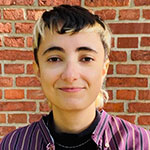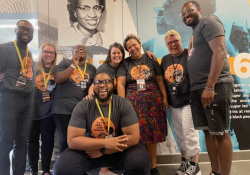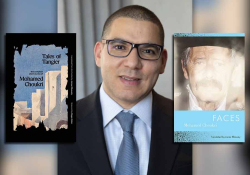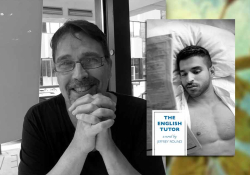A Conversation with Translators Charlotte Collins and Ruth Martin
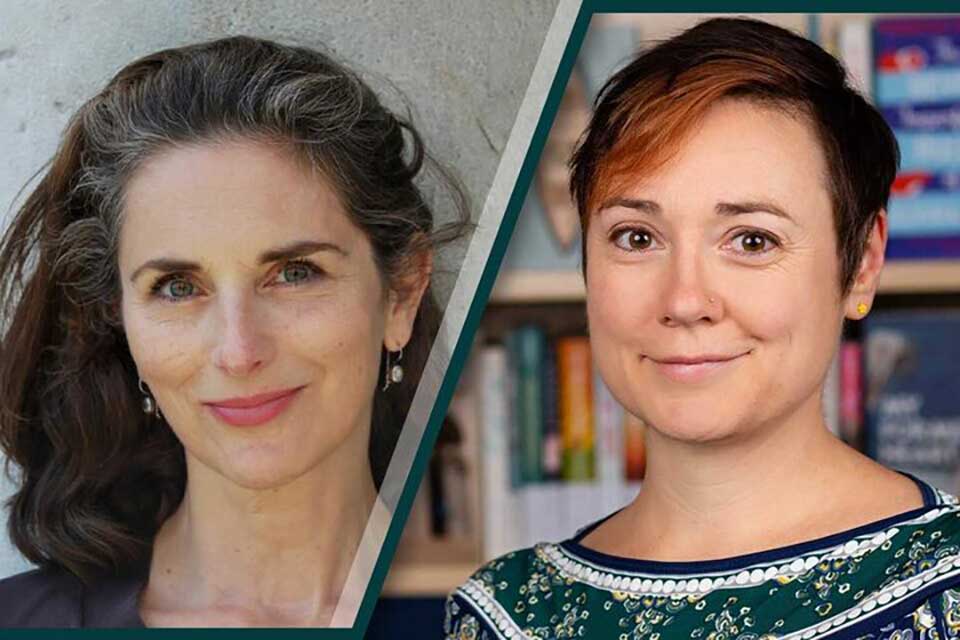
With the Open University of Catalonia in Barcelona’s project “The Novel as Global Form: Poetic Challenges and Cross-Border Literary Circulation,”* a group of scholars is studying thirty recent novels that go beyond the national sphere and are projected into the international literary space. Among this corpus of texts is The Eighth Life (for Brilka), by Nino Haratischvili, chosen especially for its role in the internationalization of less translated literature, like that coming from Georgia. This project led me to interview the English translators of The Eighth Life (for Brilka), Charlotte Collins and Ruth Martin.
Aitana Bellido: Your translation into English of The Eighth Life (for Brilka), originally published in German in 2014, won the 2020 Warwick Prize for Women in Translation. What brought you to the novel in the first place?
Charlotte Collins: I think we came to Nino before we came to the book. We met her at the British Centre for Literary Translation Summer School that we both did in 2012. After that, I translated a play of hers, and we met in Germany when she was in the process of editing The Eighth Life. With both plays and the two novels she had published, she was actually trying to avoid being pigeonholed as a Georgian author. As a migrant, she wanted to avoid the assumption that she had to write about the country she came from. Scribe, the publisher who eventually took the book, showed an interest in her work (and not only because of her background); they had a particular interest in Georgia. They asked me to translate it, and I said yes, and that I’d like to do it with my colleague Ruth. So, that’s how we came to the book.
Ruth Martin: Back in 2012, I talked to a couple of publishers about the book that we were working on in that workshop [My Soul Twin, published in 2022 by Scribe UK]. They ultimately decided that it wasn’t for them.
Collins: I think that, before The Eighth Life, we were told that it could be difficult to persuade publishers to take on a book in translation. You needed to be able to tell them what differentiates it from a book originally written in English. When The Eighth Life came out, this allowed us to say, “We have this book by this author, who is really successful,” which usually persuades publishers.
Bellido: As literary translators, what made you choose to work on this novel with each other? What are the benefits and drawbacks of co-translating a novel of 1,200 pages like this one?
Martin: We do have different working styles, but the results that we come out with are quite similar. That did make it easier. If we had been very different translators, we couldn’t have done it, but we just split the novel into the different books and translated 50 percent each. Then we went over each other’s work very carefully and edited it to give it a consistent voice all the way through. It didn’t feel like a massive chore, really. We have different vocabulary and different ways of doing things, but it felt pretty easy, actually, as a process.
Collins: And that’s partly why, when Philip asked me if I wanted to translate it, I knew that I wanted to do it with Ruth, because it was clear that we had a similar way of working and that we worked well together. And I knew that I didn’t want to do the book on my own. It seemed like the right thing.
Bellido: Gvantsa Jobava, the Georgian editor of the novel, first heard about Nino Haratischvili thanks to a Georgian translator based in Germany. What do you think about the role of literary translators in the publishing industry? Do they still have an influence on what is published, or is this a role that is slowly disappearing with the presence of book fairs, book prizes, and social media?
Martin: I think publishers still rely on translators a lot. You know, we are the ones who are reading all of the books in our source languages. It does depend on the language because Scribe, for example, works with a scout in Germany who is actively looking for German books. So perhaps they rely on translators from German a bit less to actually find the books for them in the first place, but that’s certainly not the case with other publishers, and there’s still a lot of pitching that goes on from translators and especially with less commonly spoken languages in the UK. In those cases, publishers are almost wholly reliant on translators.
Collins: If you’re cold-pitching a book to a publisher and they don’t know you, that doesn’t tend to be successful, although with The Eighth Life, unusually, it was. Scribe is really good with books we suggest because they’ve worked with us, they know our taste, and they trust us. We’ve come to them with Nino’s two other books, and I think you [Ruth] brought Shida Bazyar’s book [Sisters in Arms]. However, they won’t just take our word for it. If we come to them with a book, they’ll get somebody else to look at it. And yes, things like social media or book fairs or prizes bring certain books to the attention of publishers, or, you know, with certain books, there’s a buzz around them already, and you’ll find that several publishers are saying, “Oh, have you heard about this book?” But then, who are they going to, who can they find out about books from? They have to go to the translators.
Bellido: Maia Panjikidze, the Georgian translator of Haratischvili’s last novel, The Lack of Light, said that it was “a Georgian book written in German language.” Taking into account that Haratischvili is a Georgian author, could you sense any special or different qualities in her writing? Would you say that she uses a “conventional” German?
Martin: Yes, we absolutely could. In her choice of words, but really in her style, she’s very kind of emotional and melodramatic. And that is absolutely not what contemporary German literature is like as a rule. Her voice really does stand out, I think.
Collins: What you’ll often find in terms of style in German literature is very structured, as the German language is. And Nino has a whole emotional, melodramatic component that kind of tumbles out. Of course, she’s writing within German structures, but it’s much more. If German readers are going to criticize her writing, quite often it comes from a different way of expressing things, a different way of being, which is not very German at all.
Bellido: Melodramatic in what way?
Collins: I think it’s the content: the drama, the pace, all the disastrous things that tend to happen to the characters. Obviously, she has found a huge audience in Germany as well. And I think that the fact that it is so different is really a selling point. It seems that, for a while now, writers with a migration background have been bringing something else into German literature, whether it’s the style or the fact that they’re looking in a different direction, not just within German society. I think that a lot of the most interesting writers in Europe writing in German now are either migrants or come from a migrant background.
A lot of the most interesting writers in Europe writing in German now are either migrants or come from a migrant background.
Bellido: Literary translation involves a close and creative examination of a complex text that has many different elements to take into account. Which difficulties did you find during the translation process, and how did you overcome them? Did you encounter any “untranslatable” terms or elements?
Collins: It wasn’t that the words or the language themselves were difficult. What took up a lot of time was researching things that were quite specific, like the kind of pinafore that children wore to school or the sweets that they had in Soviet Russia or 1920s Georgia. We also spent a lot of time tracking the sources of quotations, which Nino had not included, and back-translating from Russian, which we don’t speak, which was interesting [laughs].
Bellido: As translators, do you usually keep in touch with writers and other translators? In the particular case of The Eighth Life, what kind of contact or collaboration did you have with the author?
Collins: At the beginning, she said she wanted me to check every single word with her, which she came to bitterly regret [laughs]. I was sending her long, long lists of questions, and in the end I think it just completely overwhelmed her, and we kind of had to stop. For the first three books [of The Eighth Life], we were consulting with her on every little detail, and then once we got past World War II, we kind of just left the list for the editors to deal with.
Martin: For Juja, the subsequent book by Nino I translated, I sent her one list of questions, maybe two, not a lot. My questions were like, “Can I sort this out, this small problem?” and Nino just said, “Yes, go on. I trust you. It’s fine.”
Collins: I think until The Eighth Life, Nino really wanted to make sure that it was done the way she wanted, and she wanted to have a sense of control. I don’t think she realized how much time and energy that was going to take, to basically go back to a book she’d finished several years earlier, when her head was somewhere else completely. And I think now she knows us, and she trusts us.
Bellido: Sometimes, writers write in a clear language to reach a wider audience. Do you think that Nino chose to talk in a more straightforward way for an international reader about the history of Georgia when she was writing The Eighth Life (for Brilka)?
Martin: I don’t think I would call this novel straightforward in any way. But yes, there is definitely that element to it. And I do wonder whether that had something to do with its international appeal and that it was already explaining Georgia for non-Georgians in its original form. Because it’s not like no novels from Georgia get translated into English, but this has been a real sort of breakthrough.
Collins: I do think it’s not only about Nino having a foot in both countries but also about the novel itself being set in so many different places. It starts in Georgia, goes up to Russia, comes to Austria, then to London. . . . It’s an international novel in its setting, in the experiences the characters have. That’s the way the book is done, and that makes complete sense to me. For instance, Lack of Light is a wonderful book, but it’s very much a Georgian book. We always thought The Eighth Life would make a fantastic TV series, partly because it’s an amazing soap opera, partly because the TV company has to sell it to an international audience. It was always a novel that spanned a huge period of time, many, many characters, and many places, and I think that is part of its appeal.
Bellido: To what extent do you think that translation calls into question the very idea of authorship, or blurring the boundaries between original work and translation? What are your views on this question?
Martin: I think it is becoming more of an issue now that translators are being more visible generally, and making sure that we retain our copyright as a very basic thing, or getting our names on the cover of the book alongside the author. And there’s a lot more interest now in translation studies. People are realizing that translation is a kind of writing and is a skill that you have to develop.
Collins: And it’s creative.
Martin: Creative, yes.
Collins: But I think among translators people feel differently about how to define it. There are those who say, “I don’t want my name on the cover, I’m just working for hire,” and people who say, “No, I’m the co-author.” And everything in between. My feeling is that it is certainly creative work. Do I feel uncomfortable using the word “author”? I mean, although we’re part of the Society of Authors, I wouldn’t say, “I have co-authored this book.” I’m not an author in that sense because I couldn’t let my imagination fly and come out with all these lovely things that authors do. But people sort of fall in different places on that spectrum.
Martin: But also there are certain translations that require more input from the translator, that fall closer to actual authorship. I’m thinking about a novel written in Swiss dialect by Pedro Lenz called Der Goalie bin ig that was translated by Donal McLaughlin into Glaswegian dialect. That’s a huge creative feat. And that was a very different book from the one that Pedro Lenz originally wrote. Where does translation stop and actual authorship begin? It’s never the same level in any two books.
Where does translation stop and actual authorship begin? It’s never the same level in any two books.
Collins: I think the main thing for most of us is simply to be acknowledged and to be credited.
Bellido: And thinking about authorship and translation, what are the roles of prizes like the Warwick Prize for Women in Translation and prizes that also make translators visible, like the International Booker Prize? In terms of the visibility of translators, and maybe also in the visibility of lesser-known identities or countries?
Martin: I don’t know. I think certainly things like the International Booker Prize have that kind of kudos from the name. The fact that it recognizes the translator and the author equally is a wonderful thing and has hugely raised the profile of translation in the last few years. Whether it’s materially improved conditions for translators, I don’t know. Maybe these prizes have had some effect on that.
The percentage of books sold in translation now has jumped hugely in the last few years.
Collins: I think they have helped to make people aware that translators exist, and the fact that they are giving that level of importance to the translator has made some difference. According to the statistics, the percentage of books sold in translation now has jumped hugely in the last few years. I mean, some of it is dependent on certain genres, like manga. One of the arguments that you used to hear from publishers, although I don’t really hear it so much anymore, was that they couldn’t put the translators on the cover or credit the translators or give them any attention because that would put people off reading the books, and that just doesn’t seem to be borne out at all.
A lot more people are reading translated literature, young people in particular. Older readers may be more likely to say, “Oh, but I wouldn’t want to read a translation because I’m not sure that I’m reading the authentic, original thing.” Do you read Russian? Because if you don’t, then you’re gonna have to read in translation or give up on Tolstoy. It’s a very odd argument that you do still hear, usually from older people, but I think younger people just want a great story.
October 2023
*(Spanish Research Agency, PID2020-118610GA-I00), led by Neus Rotger and Marta Puxan-Oliva.
Editorial note: Aitana Bellido would like to thank Ana Kvirikashvili for her assistance with questions for this interview.
Charlotte Collins studied English literature at Cambridge University and worked as an actor and radio journalist in Germany and the UK before becoming a literary translator. In 2017 she was awarded the Goethe-Institut’s Helen and Kurt Wolff Translator’s Prize for Robert Seethaler’s A Whole Life. Other translations include Seethaler’s The Tobacconist, Walter Kempowski’s Homeland, Bernhard Schlink’s Olga, and Darkenbloom, by Eva Menasse.
Ruth Martin studied English literature before earning a PhD in German. Since 2010, she has been translating fiction and nonfiction books by authors ranging from Joseph Roth and Hannah Arendt to Volker Weidermann and Shida Bazyar. She has taught translation at the University of Kent and the Bristol Translates summer school, and is a former co-chair of the Society of Authors Translators Association.
